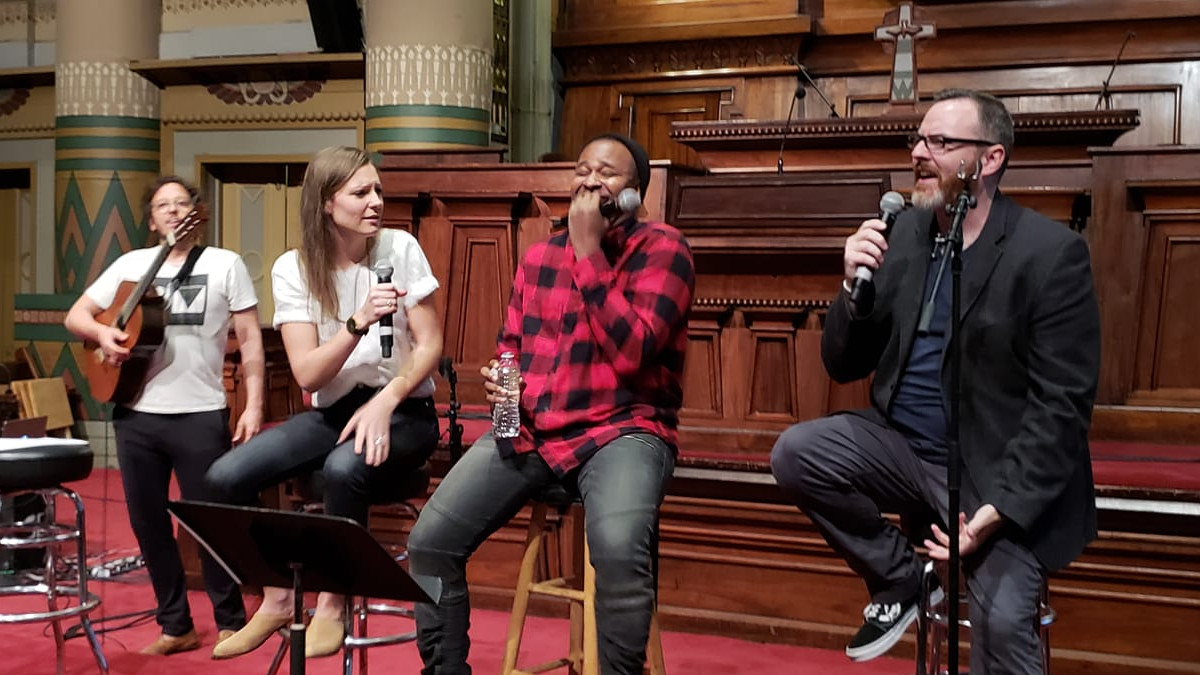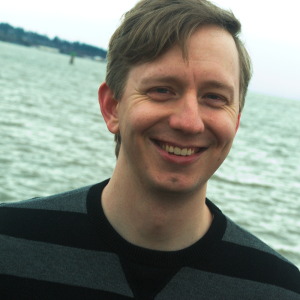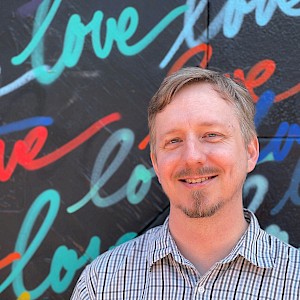Things Are About to Get Weird

The Liturgists is one of my favorite podcasts because they discuss some great topics through the lenses of science, art, and faith. When I started listening, there were two main hosts. Science Mike, as the nickname suggests, has a love for science and is great at crunching information and conveying it in meaningful ways. He has a wild story of losing his faith then having a mystical experience with God. I recommend his book Finding God in the Waves for more about that. Michael Gungor is a talented musician who also has an interesting story of deconstructing and reconstructing his spirituality. In the last year they have added co-hosts Hillary McBride, a therapist and researcher; and William Matthews, another talented musician. I love hearing all of them together and honestly I kinda want to be best friends with them.
The show has drawn in a diverse audience on the spiritual spectrum — from evangelical Christians to atheists. Many of them feel frustrated or spiritually homeless after dealing with religious trauma. To help foster community and connection, the hosts organize Liturgists Gatherings. These are part conference talks, part spiritual practices, part live podcast, and a great way to connect with others in this delightfully weird community. Unfortunately I missed the Los Angeles gathering last year. When they announced one in Nashville, I decided to go.
“[The Liturgists] is sort of a hospital for people that have been hurt by religion or by their groups. To have a non-judgmental space where they can come and converse and heal and hear ideas — that you’re not alone and it’s okay.”
— , Sunlight
I showed up Friday night at Downtown Presbyterian Church. There were about 700 people there. It’s an old church with a beautiful, huge pipe organ. There was a number we could text questions for the hosts, so I asked if Michael would play the pipe organ for us. Unfortunately he did not.
The Mikes started by acknowledging where we were and that for some of us, being in a church might feel uncomfortable or even trigger past traumas. They cautioned us, “What affirms you is going to trigger someone else and what triggers you will affirm someone else.” Things might get a bit messy and definitely weird.
Micky ScottBey Jones came out and read her poem:
Together we will create brave space
— , “Invitation to Brave Space” (archived)
Because there is no such thing as a “safe space”
We exist in the real world
We all carry scars and we have all caused wounds.
In this space
We seek to turn down the volume of the outside world,
We amplify voices that fight to be heard elsewhere,
We call each other to more truth and love
We have the right to start somewhere and continue to grow.
We have the responsibility to examine what we think we know.
We will not be perfect.
This space will not be perfect.
It will not always be what we wish it to be
But
It will be our brave space together,
and
We will work on it side by side
This was a beautiful re-framing of the idea of safe spaces and I love it.
To start us off in the weirdness, we were asked by show of hands to identify where we were at spiritually on a scale of one to five. One being: “I think this is all bullshit, but I like something about what you’re doing here.” Five being: “I’m totally cool with God.” About 2/3 of the audience were 3+. They asked us to get up and introduce ourselves to people around us, tell our number, and welcome each other. “And I don’t just mean the fives welcoming the ones. Ones, greet the fives and tell them, ‘you are welcome here, even though you believe this bullshit.’” That got a good laugh but underlined the important message that we are all welcome just as we are. I identified as a 4. While my faith has certainly evolved over the years and I’ve had my doubts, I think my core belief in the goodness of God hasn’t changed that much.
The rest of the session consisted of some exercises to help us connect with each other and our own spirituality in healthy ways. The first one was called “Pass the Pride.” We are so often accustomed to being overly self-effacing and not talking about ourselves in a positive way. The exercise was to greet people around us again saying, “Hi, my name is [blank] and I’m really good at [blank],” and affirming each other in response. I decided to say “I’m really funny.” It was interesting to see how difficult/uncomfortable this exercise was for some people and it felt great to affirm people. I certainly have thought that I’m funny, but I rarely verbalize it without some diminishing qualifier. After each exercise the Mikes asked how it made us feel. People would just call out their answers. It was interesting to hear the broad range of responses.
The next exercise was eye-gazing: find someone and silently gaze in their eyes for 30 seconds. I opted out of this one, though in retrospect I wish I had pushed myself to try it. It felt weird to be sitting while most people around me were sharing these intimate moments. In the reactions to that exercise, some people said it felt like falling in love, or like they were about to make out. One person said they felt bored. Another person that opted out said they felt like they were intruding.
My favorite exercise was the singing. We only sang one word: “shalom.” There was no direction on how to sing it other than we would start quietly and repeat it. It was powerful to be in a room with that many people (about 700!) singing shalom, breathing together between each time. We gradually got louder and then quieter again. We did a second round of that with the intent of singing it towards the marginalized, the oppressed, those with the proverbial boot on their neck.
On Saturday morning, Science Mike did a session about compulsion and addiction. He made a compelling case that shame leads to disconnection and taboo. Modesty culture and purity culture don’t help and can lead to abuse. We should avoid using shame, punishment, and prohibition. Instead we should educate through open conversation, promote connection, and recondition with professional support. There was a lot of good brain science he distilled in the session but unfortunately I did not take the best notes. I think some of this talk will be part of his next book.
Michael’s session was really interesting and hard to convey in words. A recurring question they get is about how to re-construct after going through deconstruction. Sometimes we associate deconstruction with failing at our spirituality. He re-framed by suggesting: instead of “failing,” what if it actually worked? What if you had succeeded and found more freedom through the process?
He then told a really vulnerable story about when his daughter was diagnosed with Down Syndrome at birth. His initial reaction was very selfish. When that reaction subsided and he held his daughter, he was overwhelmed with love as any parent would be. They love her so much exactly as she is. She recently asked him for the first time, “am I pretty?” If she could see herself through his eyes for just a second, she would have no doubt.
He wanted to tell everyone in the room that day that they are loved exactly as they are — and he would — but it’s still “just words,” so he wanted to try to show us. He went backstage and returned with a flower. He stood center stage holding the flower in silence. He looked at it for a while, smelled it slowly, and looked out into the audience. After a few minutes of that, he started walking down the aisle into the audience. He stopped in front of someone’s seat, kneeled down, and held the flower between them while looking in their eyes. After a minute or two, he got up, walked the aisle some more, and repeated the process. Eventually someone took the flower from him, got up, and continued the process instead of Michael. Michael introduced a few more flowers so there were more people involved.
This practice went on for about 30 minutes in complete silence. It was really interesting to watch and to just be in the room. Some people knelt and did the eye-gazing. Others were more casual, handing the flower to someone. I had a mixture of feelings while watching. I had some kind of good, overwhelming emotion that I am not sure how to describe. It felt heavy, but not in a negative way. I was seated about 4 people in from the aisle so thought there was no chance someone would be offering me the flower, but then I saw people had started reaching into the aisles to give it to people. I got a little anxious then, wondering what I would do if offered the flower.
Aside: they named their daughter Lucie, which means light. They wrote this beautiful song about her which will make you cry:
Saturday afternoon they recorded a live episode on the topic of fear. I liked when Hillary talked about how fear can be good, as a way that our bodies try to protect us from trauma. Sometimes fears linger beyond their helpfulness, though, and we’ve never been told “you no longer need to fear this.” There was also a really good meditative exercise where we envisioned visiting our younger selves, noticing if they needed anything, and giving it to them. I have linked the episode below, along with some other favorites.
The event was wrapped up with Eucharist. They acknowledged that not everyone would be comfortable participating. They didn’t want anyone to feel left out just sitting there, so the hosts would be up front to give hugs to anyone who wanted one. I opted for both communion and a hug. Hillary gave a very good hug and said “You are fully accepted, fully known, and fully loved.” It was really beautiful to watch them hug people for as long as they needed. It wasn’t a short, casual thing. We sang “Vapor,” then William Matthews led us in singing “We’ll All Be Free,” both very moving songs.
Tell your sister, tell your brother
Tell your father, tell your mother
Tell yourselves, tell everybody
We’ll all be free— , “We’ll All Be Free”
Saturday night there was an after-party for Patreon supporters. The venue was small so the tickets went very quickly early in the day and I didn’t get one. It started at 10pm and they told us at 11pm they would open it up to one-in, one-out, so there was still a possibility of getting in. I’m getting old now so I debated whether I wanted to go out that late, but I realized I had already come across the country for this event so it would be silly not to try. I had some good conversation in line with other Liturgists. When Mike and Michael arrived, I got to give them a hug, since I had not during Eucharist.
It was a beautiful weekend. I am really glad I was able to go and be part of creating a space where people felt welcomed and not alone. Over the last several years I think I have been on this arc of being drawn to communities that are addressing trauma and seeking healing. I haven’t had a particularly traumatic experience myself, but I want to be part of the communities that are bringing healing. That’s what I think The Liturgists community is.
Here are some of my favorite episodes and related links:
- Fear - Live from Nashville
- Shame - Live from Seattle
- The Enneagram
- Darren King’s Instagram videos from the weekend, including audio of singing shalom
- William Matthews’ album, Kosmos
This post is already long enough, but I would be remiss if I didn’t mention a really great community of Liturgists singles I’ve connected with after Nashville. This group is basically the only reason I am still using Facebook. If any of the above resonated with you and you’re single, you should check us out: The Liturgists Singles Community.
Photo by Cori McKenzie, used with permission.
Responses
★ Hillary L McBride, Todd Grotenhuis, Jayla DamarisAdd Your Response
This is an older post, so the public comment form is now closed. You can still use the form above to send me the link of your reply or sign in with your email to leave a comment. You can always send me a message, too.


